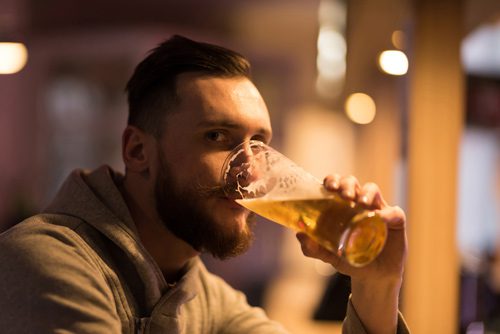
Social Anxiety: The Struggle
Even though many people are hesitant to talk about their struggles, social anxiety is common. About 7% of the general population has been diagnosed with a social anxiety disorder, and it is believed that the condition often goes undiagnosed because of the general stigma surrounding mental health care. For example, one study found that fewer than 5% of people diagnosed with it looked for any treatment in the first year of noticing symptoms.
Suffering from social anxiety is widely believed to be a risk factor for addiction. One-fifth of people with social anxiety disorder meet the criteria for a co-occurring alcohol use disorder (AUD).
Social anxiety disorders and alcohol use disorders can reinforce each other—wreaking havoc on a person’s day-to-day life. For people with social anxiety disorder and AUD, it’s important that both conditions are treated at the same time to lay the foundation for a lasting recovery.
What Causes It?
Social anxiety disorders can have many different causes. For example:
- Genetics. There is some evidence that suggests social anxiety disorder could be hereditary. It is estimated that about one-third of the overall risk of developing an anxiety disorder can be attributed to genetic factors.
- Environment. Negative experiences like bullying, rejection, and family conflict are known to be contributing factors to social anxiety later in life. A common pattern of shyness in childhood has also been noticed.
- Gender. Of people diagnosed with social anxiety, women have been found to be diagnosed at twice the rate as men.
What Are the Symptoms of a Social Anxiety Disorder?
Social anxiety disorders, also referred to as social phobias, make it difficult to complete day-to-day tasks that involve social interaction. Some of the symptoms of a social anxiety disorder include:
- Being afraid of being judged by peers and/or strangers
- Finding it difficult to interact with strangers
- Expecting the worst possible outcome in social situations
- Avoiding common social situations like returning items to a store, dating, or dining in a restaurant
- Avoiding crowded places or public events
- Being repeatedly anxious beforehand about social situations where one might be the center of attention
- Trying to not talk to people due to fear of embarrassment
- Avoiding eye contact when speaking to others
- Experiencing physical symptoms such as sweating or blushing when a social situation is unavoidable
- Worrying excessively about minor mistakes that may have been made in a social situation, such as forgetting a person’s name or mispronouncing a word
How Can Social Anxiety Lead to AUD?
In the majority of cases, people with social anxiety disorder begin drinking to ease some of the worry that comes from being in social situations. Alcohol is sometimes even referred to as a “social lubricant” because it’s a depressant and slows down the central nervous system, which results in a calming effect that makes it easier for someone with social anxiety to handle interacting with others.
Unfortunately, drinking isn’t a very good long-term solution for dealing with social anxiety. Excessive alcohol consumption will eventually create far more problems than it solves.
Alcohol can disrupt your serotonin levels, which can actually increase your anxiety for several hours after drinking. This is what’s commonly called “hangxiety.” Becoming even more anxious under this mindset just encourages a person with a pre-existing social anxiety disorder to continue drinking. This quickly turns into a vicious cycle that sets the stage for increased alcohol tolerance, physical dependence, and addiction.
Some signs of AUD include:
- Feeling a loss of control over one’s drinking or drinking more than intended
- Experiencing cravings for alcohol
- Suffering from withdrawal symptoms like sweating, shaking, and nausea
- Conflict in relationships related to drinking
- Legal problems caused by drinking
- Financial problems caused by drinking
- Worsening performance in work or school
- Ignoring other responsibilities to spend more time drinking
How Can Mountain Laurel Recovery Center Help?
Mountain Laurel Recovery Center’s Pennsylvania residential addiction treatment center provides evidence-based care that is personalized to fit individual needs. Our experienced addiction treatment professionals help clients address the underlying factors that may have contributed to their struggles with substance abuse, including the effects of social anxiety disorders.
If your social anxiety is making it difficult to regulate your alcohol consumption, you’re not alone. Our team is standing by to help you take the first steps towards a brighter future.
